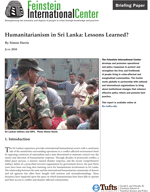Researchers at the Feinstein International Center (FIC) at Tufts University have embarked on a major two-year research project on Humanitarian Action and Politics. This project builds upon and expands on the earlier research on Humanitarian Agenda 2015 — Principles, Power and Perceptions (HA2015) which involved 13 country case studies of local perceptions of humanitarian action and a synthesis report.
Our new research is in two separate but related phases. Phase I is policy-oriented: building on the HA2015 case studies and subsequent field work, it looks at the challenges faced by humanitarian actors in recent crises – Afghanistan, Sri Lanka, Darfur, Somalia, and Pakistan – and at the policy and operational implications for UN agencies, NGOs, and donors. The briefing papers we are issuing look at the policy implications of recent crises and capture widespread feeling that, despite obvious differences in the countries studied, developments in the humanitarian-political relationship are challenging the fundamentals of humanitarian action. These papers are intended to stimulate debate among practitioners and policy-makers. The papers will be further revised and expanded later in 2010.
This briefing paper summarizes the key issues and dynamics that have shaped the humanitarian experience in Sri Lanka and draws lessons that, if learned, may help inform humanitarian engagement in other international contexts.







